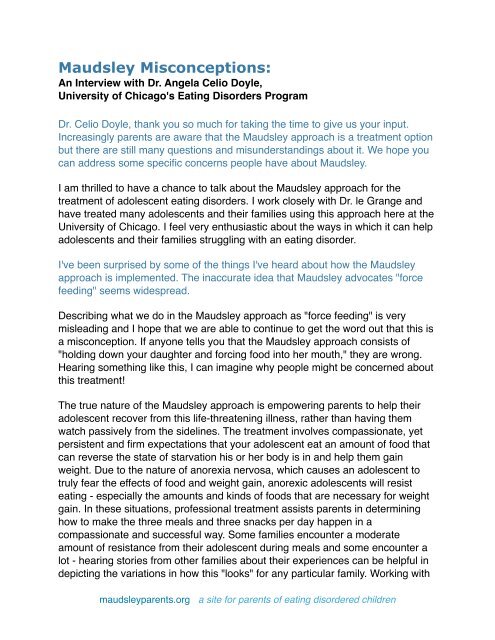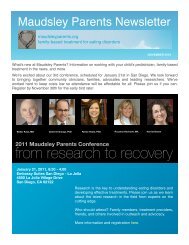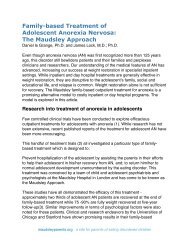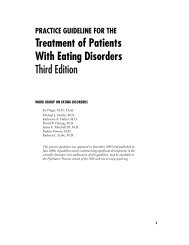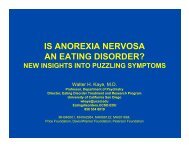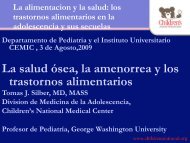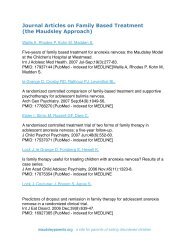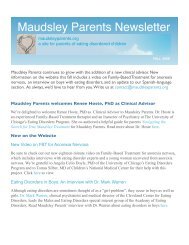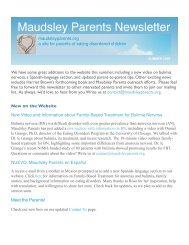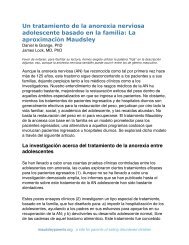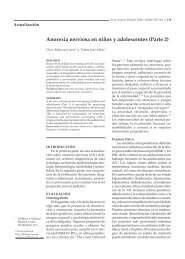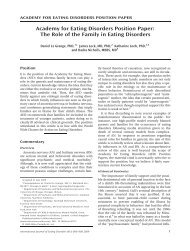printable view - Maudsley Parents
printable view - Maudsley Parents
printable view - Maudsley Parents
Create successful ePaper yourself
Turn your PDF publications into a flip-book with our unique Google optimized e-Paper software.
<strong>Maudsley</strong> Misconceptions:<br />
An Inter<strong>view</strong> with Dr. Angela Celio Doyle,<br />
University of Chicago's Eating Disorders Program<br />
Dr. Celio Doyle, thank you so much for taking the time to give us your input.<br />
Increasingly parents are aware that the <strong>Maudsley</strong> approach is a treatment option<br />
but there are still many questions and misunderstandings about it. We hope you<br />
can address some specific concerns people have about <strong>Maudsley</strong>.<br />
I am thrilled to have a chance to talk about the <strong>Maudsley</strong> approach for the<br />
treatment of adolescent eating disorders. I work closely with Dr. le Grange and<br />
have treated many adolescents and their families using this approach here at the<br />
University of Chicago. I feel very enthusiastic about the ways in which it can help<br />
adolescents and their families struggling with an eating disorder.<br />
I've been surprised by some of the things I've heard about how the <strong>Maudsley</strong><br />
approach is implemented. The inaccurate idea that <strong>Maudsley</strong> advocates "force<br />
feeding" seems widespread.<br />
Describing what we do in the <strong>Maudsley</strong> approach as "force feeding" is very<br />
misleading and I hope that we are able to continue to get the word out that this is<br />
a misconception. If anyone tells you that the <strong>Maudsley</strong> approach consists of<br />
"holding down your daughter and forcing food into her mouth," they are wrong.<br />
Hearing something like this, I can imagine why people might be concerned about<br />
this treatment!<br />
The true nature of the <strong>Maudsley</strong> approach is empowering parents to help their<br />
adolescent recover from this life-threatening illness, rather than having them<br />
watch passively from the sidelines. The treatment involves compassionate, yet<br />
persistent and firm expectations that your adolescent eat an amount of food that<br />
can reverse the state of starvation his or her body is in and help them gain<br />
weight. Due to the nature of anorexia nervosa, which causes an adolescent to<br />
truly fear the effects of food and weight gain, anorexic adolescents will resist<br />
eating - especially the amounts and kinds of foods that are necessary for weight<br />
gain. In these situations, professional treatment assists parents in determining<br />
how to make the three meals and three snacks per day happen in a<br />
compassionate and successful way. Some families encounter a moderate<br />
amount of resistance from their adolescent during meals and some encounter a<br />
lot - hearing stories from other families about their experiences can be helpful in<br />
depicting the variations in how this "looks" for any particular family. Working with<br />
maudsleyparents.org a site for parents of eating disordered children
a professional trained in the <strong>Maudsley</strong> approach will help to determine the best<br />
way to address the resistance to eating.<br />
Another common misunderstanding is that food is pushed at the expense of<br />
emotional support. For example, a parent once asked me "<strong>Maudsley</strong> is very<br />
punitive, isn't it"<br />
This is another very inaccurate belief. <strong>Maudsley</strong> is not punitive in any way and<br />
involves quite a bit of emotional support. Some parents may fear that they are<br />
being insensitive to their adolescent if they "push" their child to eat a plate of<br />
fettuccini alfredo when the adolescent is refusing, crying, or otherwise resisting.<br />
However, if you consider a child or adolescent with a chronic illness, such as<br />
cancer, who pleads with their parent to avoid another bout of chemotherapy<br />
because it makes them feel sick, a parent would compassionately, yet firmly,<br />
determine that the chemotherapy is needed, despite how it makes them feel. In<br />
this way, some parents of adolescents with anorexia find it helpful to <strong>view</strong> food as<br />
"medicine" for their child's illness that is required to, quite literally, save their life.<br />
It is also important to remember that the resistance to eating stems from the<br />
anorexia, not the healthy, wonderful child who was overtaken by this illness.<br />
Understanding that the anorexia is separate from your adolescent may help in<br />
remembering that you are helping your child while eliminating the anorexia<br />
nervosa through increasing calorie consumption.<br />
Some parents also become concerned that if they ask their adolescent to eat<br />
more than they want that this will harm their relationship with their child. For<br />
instance, one father I worked with did not want to insist upon whole milk with<br />
every meal because his daughter would cry and sob, saying that it was<br />
"disgusting." She would tell him how much she hated him for making her eat<br />
calorie-laden meals and snacks, which was initially quite upsetting for the father.<br />
While this was a challenging situation to deal with, when his daughter's weight<br />
was fully restored and we had progressed through the other phases of therapy<br />
(i.e., handing food control back to the adolescent and facilitating healthy<br />
adolescent development), their relationship was quite positive and strong. The<br />
daughter, when finally healthy, could see that her father had done these things<br />
because of his love for her and his devotion to keeping her alive. This situation is<br />
the norm for the families we see in the <strong>Maudsley</strong> treatment, such that the parentchild<br />
relationship is not harmed – it generally returns to pre-anorexia status.<br />
My clinical experiences working with these situations are supported by research<br />
demonstrating the same thing: in a study by Robin, Siegel, and Moye (1995),<br />
parent-adolescent relationships were actually improved at post-treatment and<br />
maudsleyparents.org a site for parents of eating disordered children
one-year follow-up compared with pre-treatment. In this study, there were<br />
reductions in conflict over food as well as mother-reported decreases in general<br />
conflict following treatment. The take-home message from this finding and our<br />
clinical experiences is that although you may face difficult conflicts during<br />
treatment due to the anorexia, as the anorexia retreats, conflicts will ultimately<br />
decrease.<br />
One other point I want to make about the <strong>Maudsley</strong> approach is that siblings, if<br />
there are any, are asked in treatment to provide emotional support to their sister<br />
or brother. The siblings are not involved in the decisions about food or in<br />
monitoring eating - which is up to the parents. Instead, siblings can be someone<br />
to complain to, a shoulder to cry on, or someone to distract them from the difficult<br />
task of eating. The exact role will depend on the age and pre-existing<br />
relationships, but siblings can be incredible resources for helping an adolescent<br />
in their recovery.<br />
And weight restoration is just one part of the <strong>Maudsley</strong> approach, correct<br />
Yes, weight restoration is just one part of the <strong>Maudsley</strong> approach. It is<br />
emphasized first during treatment and may take many months, for most families,<br />
to address. Most of the symptoms experienced by people with anorexia, from<br />
dizziness and feeling cold to irritability and depressed mood, are a result of<br />
physical starvation. Likewise, many of the distorted thoughts about food and<br />
body weight/shape are reinforced and perpetuated by a low weight. So, it is<br />
critical as the first step that parents are resolute about helping their adolescent<br />
achieve a healthy weight. Once an adolescent is weight-restored and the parents<br />
feel confident in their ability to prevent their adolescent from losing weight,<br />
decisions about food and eating are slowly and carefully returned to their<br />
adolescent. This is done slowly in order to ensure that the adolescent is capable<br />
of making these decisions without the anorexia making the decisions for them.<br />
Finally, the last phase is focused on establishing a healthy parent-adolescent<br />
relationship that does not involve the anorexia and addressing the ways in which<br />
the anorexia may have prevented the adolescent from going through normal<br />
adolescent development. For instance, some adolescents with anorexia may<br />
have become very withdrawn from friends, so one focus might be improving the<br />
adolescent's peer relationships by encouraging age-appropriate activities. In<br />
effect, the goal is to get the adolescent "back on track" with their health, their<br />
relationships, and their personal life goals.<br />
maudsleyparents.org a site for parents of eating disordered children
Eating disorders often arise during adolescence; just when we expect teens to<br />
become more independent. Another stumbling block in understanding is that it<br />
seems "wrong" for parents to oversee something as basic as eating at this time<br />
of life. Can you address that<br />
It may feel strange to oversee and be in charge of something as basic and<br />
seemingly personal as eating, especially with older teenagers. Developing<br />
independence is an important part of healthy adolescent development. When an<br />
adolescent has anorexia nervosa, however, food choices are one part of<br />
independence that must be temporarily withdrawn. Other aspects of an<br />
adolescent's independence, as determined by the parents, are not restricted. For<br />
instance, a 17-year old who previously was allowed to drive his/her car to friend's<br />
houses, go to school dances, and decide what movies they want to see would<br />
still have those important freedoms. Decisions about meals and snacks and<br />
when/what to eat, on the other hand, are temporarily in the hands of parents.<br />
These decisions are returned as soon as the adolescent is able to keep<br />
themselves healthy because the ultimate goal is to help the adolescent return to<br />
a normal adolescent life, with increasing independence in all areas of life.<br />
Something important to remember is that anorexia nervosa renders even the<br />
smartest and most rational adolescent unable to make consistently healthy<br />
decisions about eating. In every other way, your adolescent may be functioning<br />
at a very high level, and this is to be supported and applauded. But it is important<br />
to understand that if food choices are left to a person with anorexia, the almost<br />
inevitable consequence is weight loss or maintenance of an unhealthy low<br />
weight.<br />
The idea that eating disorders are "about control" is something I hear often.<br />
Along those same lines it's sometimes suggested that <strong>Maudsley</strong> treatment will<br />
make the eating disorder worse.<br />
Both from our clinical experience and reflected in the research data, the majority<br />
of adolescents respond well to the <strong>Maudsley</strong> treatment. Of course, no treatment<br />
works for everybody, so there are a small number who do not "respond" to this<br />
treatment - in other words, they maintain their current status rather than get<br />
"worse."<br />
That said, a desire for control is often cited as a reason for the development and<br />
persistence of anorexia nervosa and this may, indeed, be the case for many<br />
adolescents. However, eating is in fact out of a person's control when one has<br />
maudsleyparents.org a site for parents of eating disordered children
anorexia, such that they are not able to eat enough to achieve a healthy weight.<br />
The healthy adolescent is no longer in control - the anorexia is.<br />
Another important aspect to consider is that control over a life-sustaining<br />
function, like eating, should not be negotiable as the way to express control. If<br />
you found out your adolescent was using cocaine, would you allow them to<br />
continue using the drug, for fear of taking away their "control" Probably not,<br />
because you know that drugs will have a detrimental effect on his/her life. In the<br />
same way, allowing your adolescent to starve oneself for fear of taking away<br />
"control" will have a detrimental effect. Ultimately, the treatment can address the<br />
concerns leading to this need for control once the adolescent is physically<br />
healthy (and thus mentally able) to discuss these issues. <strong>Parents</strong> have a<br />
responsibility to help a sick child, whether it is by helping them with their insulin<br />
injections for diabetes, or by expecting that they maintain a healthy weight. By<br />
helping your adolescent overcome this illness, you will actually enable them and<br />
prepare them to have more effective control over their lives.<br />
Author bio:<br />
Angela Celio Doyle, PhD, is a clinical psychologist working at the University of Chicago in the Eating<br />
Disorders Program with Daniel le Grange, PhD. She sees numerous boys and girls with anorexia nervosa<br />
and their families for therapy. Dr. Celio Doyle received her PhD in Clinical Psychology from the University<br />
of California at San Diego (Joint Doctoral Program with SDSU) after earning a bachelors and a masters<br />
degree at Stanford University. She spent three additional years at Stanford University helping to develop<br />
and test prevention programs for eating disorders in adolescents and young adults. Dr. Celio Doyle's<br />
research interests include the prevention and treatment of eating disorders in youth as well as the use of<br />
the Internet for health promotion.<br />
Dr. Celio Doyle feels passionately about helping adolescents recover from eating disorders with the loving<br />
support of their parents and is committed to finding empirically-supported treatments for this purpose. She<br />
hopes that her professional experience may be a resource to the parents on this website.<br />
http://psychiatry.uchicago.edu/clinical/clinics/edp/acdoylebio.html<br />
maudsleyparents.org a site for parents of eating disordered children


